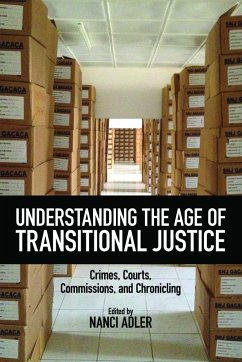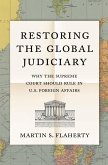Understanding the Age of Transitional Justice
Crimes, Courts, Commissions, and Chronicling
Herausgeber: Adler, Nanci
Understanding the Age of Transitional Justice
Crimes, Courts, Commissions, and Chronicling
Herausgeber: Adler, Nanci
- Broschiertes Buch
- Merkliste
- Auf die Merkliste
- Bewerten Bewerten
- Teilen
- Produkt teilen
- Produkterinnerung
- Produkterinnerung
Analyses the processes, products, and efficacy of a number of transitional justice mechanisms and looks at how genocide, mass political violence, and historical injustices are being institutionally addressed. Contributors invite readers to speculate on what (else) the transcripts produced by these institutions tell us about the past and the present.
Andere Kunden interessierten sich auch für
![New Critical Spaces in Transitional Justice New Critical Spaces in Transitional Justice]() Arnaud KurzeNew Critical Spaces in Transitional Justice26,99 €
Arnaud KurzeNew Critical Spaces in Transitional Justice26,99 €![Gun Debate Gun Debate]() Philip J. CookGun Debate17,99 €
Philip J. CookGun Debate17,99 €![Presidential Visions of Transitional Justice Presidential Visions of Transitional Justice]() Ruti G TeitelPresidential Visions of Transitional Justice35,99 €
Ruti G TeitelPresidential Visions of Transitional Justice35,99 €![Restoring the Global Judiciary Restoring the Global Judiciary]() Martin S FlahertyRestoring the Global Judiciary30,99 €
Martin S FlahertyRestoring the Global Judiciary30,99 €![The Future of War Crimes Justice The Future of War Crimes Justice]() Chris StephenThe Future of War Crimes Justice13,99 €
Chris StephenThe Future of War Crimes Justice13,99 €![Colonialism Is Crime Colonialism Is Crime]() Marianne NielsenColonialism Is Crime35,99 €
Marianne NielsenColonialism Is Crime35,99 €![The United States and the Armenian Genocide The United States and the Armenian Genocide]() Julien ZarifianThe United States and the Armenian Genocide39,99 €
Julien ZarifianThe United States and the Armenian Genocide39,99 €-
-
-
Analyses the processes, products, and efficacy of a number of transitional justice mechanisms and looks at how genocide, mass political violence, and historical injustices are being institutionally addressed. Contributors invite readers to speculate on what (else) the transcripts produced by these institutions tell us about the past and the present.
Produktdetails
- Produktdetails
- Verlag: Rutgers University Press
- Seitenzahl: 258
- Erscheinungstermin: 22. Juni 2018
- Englisch
- Abmessung: 233mm x 196mm x 15mm
- Gewicht: 358g
- ISBN-13: 9780813597768
- ISBN-10: 0813597765
- Artikelnr.: 50855071
- Herstellerkennzeichnung
- Libri GmbH
- Europaallee 1
- 36244 Bad Hersfeld
- gpsr@libri.de
- Verlag: Rutgers University Press
- Seitenzahl: 258
- Erscheinungstermin: 22. Juni 2018
- Englisch
- Abmessung: 233mm x 196mm x 15mm
- Gewicht: 358g
- ISBN-13: 9780813597768
- ISBN-10: 0813597765
- Artikelnr.: 50855071
- Herstellerkennzeichnung
- Libri GmbH
- Europaallee 1
- 36244 Bad Hersfeld
- gpsr@libri.de
NANCI ADLER is professor of memory, history, and transitional justice at the University of Amsterdam and program director of genocide studies at the NIOD Institute for War, Holocaust, and Genocide Studies (Royal Netherlands Academy of Arts and Sciences). She is the author of numerous titles, including Keeping Faith with the Party: Communist Believers Return from the Gulag.
Introduction: On History, Historians, and Transitional Justice
Nanci Adler
Part I: Truth and Justice
Chapter 1: Swinging the Pendulum: Fin de Siècle Historians in the Courts
Vladimir Petrovi¿
Chapter 2: Time, Justice and Human Rights: Statutory Limitation on the
Right to Truth?
William A. Schabas
Chapter 3: How Truth Recovery Can Benefit from a Conditional Amnesty
Jeremy Sarkin
Chapter 4: New Epistemologies for Confronting International Crimes:
Developing the IDP Approach to Transitional Justice
Stephan Parmentier, Mina Rauschenbach, and Maarten van Craen
Part II: The Trial Record
Chapter 5: The Spark for Genocide? Propaganda and Historical Narratives at
International Criminal Tribunals
Richard Ashby Wilson
Chapter 6: The International Criminal Trial Record as Historical Source
Thijs B. Bouwknegt
Part III: The Afterlife of Transitional Justice Processes
Chapter 7: Narrating (In)Justice in the Form of a Reparation Claim:
Bottom-up Reflections on a Post-Colonial Setting – The Rawagede Case
Nicole L. Immler
Chapter 8: Collective and Competitive Victimhood as Identity in the Former
Yugoslavia
Christian Axboe Nielsen
Chapter 9: Perpetrator-Victims: How Universal Victimhood in Cambodia
Impacts Transitional Justice Measures
Timothy Williams
Chapter 10: Collective Crimes, Collective Memory, and Transitional Justice
in Bangladesh
Kjell Anderson
Acknowledgments
Notes on Contributors
Index
Nanci Adler
Part I: Truth and Justice
Chapter 1: Swinging the Pendulum: Fin de Siècle Historians in the Courts
Vladimir Petrovi¿
Chapter 2: Time, Justice and Human Rights: Statutory Limitation on the
Right to Truth?
William A. Schabas
Chapter 3: How Truth Recovery Can Benefit from a Conditional Amnesty
Jeremy Sarkin
Chapter 4: New Epistemologies for Confronting International Crimes:
Developing the IDP Approach to Transitional Justice
Stephan Parmentier, Mina Rauschenbach, and Maarten van Craen
Part II: The Trial Record
Chapter 5: The Spark for Genocide? Propaganda and Historical Narratives at
International Criminal Tribunals
Richard Ashby Wilson
Chapter 6: The International Criminal Trial Record as Historical Source
Thijs B. Bouwknegt
Part III: The Afterlife of Transitional Justice Processes
Chapter 7: Narrating (In)Justice in the Form of a Reparation Claim:
Bottom-up Reflections on a Post-Colonial Setting – The Rawagede Case
Nicole L. Immler
Chapter 8: Collective and Competitive Victimhood as Identity in the Former
Yugoslavia
Christian Axboe Nielsen
Chapter 9: Perpetrator-Victims: How Universal Victimhood in Cambodia
Impacts Transitional Justice Measures
Timothy Williams
Chapter 10: Collective Crimes, Collective Memory, and Transitional Justice
in Bangladesh
Kjell Anderson
Acknowledgments
Notes on Contributors
Index
Introduction: On History, Historians, and Transitional Justice
Nanci Adler
Part I: Truth and Justice
Chapter 1: Swinging the Pendulum: Fin de Siècle Historians in the Courts
Vladimir Petrovi¿
Chapter 2: Time, Justice and Human Rights: Statutory Limitation on the
Right to Truth?
William A. Schabas
Chapter 3: How Truth Recovery Can Benefit from a Conditional Amnesty
Jeremy Sarkin
Chapter 4: New Epistemologies for Confronting International Crimes:
Developing the IDP Approach to Transitional Justice
Stephan Parmentier, Mina Rauschenbach, and Maarten van Craen
Part II: The Trial Record
Chapter 5: The Spark for Genocide? Propaganda and Historical Narratives at
International Criminal Tribunals
Richard Ashby Wilson
Chapter 6: The International Criminal Trial Record as Historical Source
Thijs B. Bouwknegt
Part III: The Afterlife of Transitional Justice Processes
Chapter 7: Narrating (In)Justice in the Form of a Reparation Claim:
Bottom-up Reflections on a Post-Colonial Setting – The Rawagede Case
Nicole L. Immler
Chapter 8: Collective and Competitive Victimhood as Identity in the Former
Yugoslavia
Christian Axboe Nielsen
Chapter 9: Perpetrator-Victims: How Universal Victimhood in Cambodia
Impacts Transitional Justice Measures
Timothy Williams
Chapter 10: Collective Crimes, Collective Memory, and Transitional Justice
in Bangladesh
Kjell Anderson
Acknowledgments
Notes on Contributors
Index
Nanci Adler
Part I: Truth and Justice
Chapter 1: Swinging the Pendulum: Fin de Siècle Historians in the Courts
Vladimir Petrovi¿
Chapter 2: Time, Justice and Human Rights: Statutory Limitation on the
Right to Truth?
William A. Schabas
Chapter 3: How Truth Recovery Can Benefit from a Conditional Amnesty
Jeremy Sarkin
Chapter 4: New Epistemologies for Confronting International Crimes:
Developing the IDP Approach to Transitional Justice
Stephan Parmentier, Mina Rauschenbach, and Maarten van Craen
Part II: The Trial Record
Chapter 5: The Spark for Genocide? Propaganda and Historical Narratives at
International Criminal Tribunals
Richard Ashby Wilson
Chapter 6: The International Criminal Trial Record as Historical Source
Thijs B. Bouwknegt
Part III: The Afterlife of Transitional Justice Processes
Chapter 7: Narrating (In)Justice in the Form of a Reparation Claim:
Bottom-up Reflections on a Post-Colonial Setting – The Rawagede Case
Nicole L. Immler
Chapter 8: Collective and Competitive Victimhood as Identity in the Former
Yugoslavia
Christian Axboe Nielsen
Chapter 9: Perpetrator-Victims: How Universal Victimhood in Cambodia
Impacts Transitional Justice Measures
Timothy Williams
Chapter 10: Collective Crimes, Collective Memory, and Transitional Justice
in Bangladesh
Kjell Anderson
Acknowledgments
Notes on Contributors
Index








